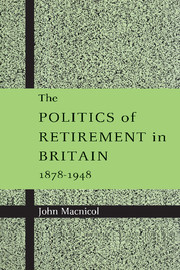Book contents
- Frontmatter
- Contents
- List of tables
- Acknowledgements
- Part I The campaign for old age pensions
- Part II Contributory pensions
- Part III The debate on retirement pensions
- Part IV The ‘Beveridge revolution’
- 13 The pensions crisis of the late 1930s
- 14 The Treasury enquiry and the 1940 Act
- 15 The origins and working of the Beveridge Committee
- 16 After the Beveridge Report, 1942–1948
- 17 Conclusion
- Index
16 - After the Beveridge Report, 1942–1948
Published online by Cambridge University Press: 01 October 2009
- Frontmatter
- Contents
- List of tables
- Acknowledgements
- Part I The campaign for old age pensions
- Part II Contributory pensions
- Part III The debate on retirement pensions
- Part IV The ‘Beveridge revolution’
- 13 The pensions crisis of the late 1930s
- 14 The Treasury enquiry and the 1940 Act
- 15 The origins and working of the Beveridge Committee
- 16 After the Beveridge Report, 1942–1948
- 17 Conclusion
- Index
Summary
In the final months leading up to the Beveridge Report's publication, some ministers in the Churchill government began to view its recommendations with growing alarm. News of its contents had become Whitehall gossip by the summer of 1942 (fed by sources such as Edward Hale's regular reports to his Treasury colleagues) and, in addition, Beveridge himself had been leaking information to the press in order to ensure that publication would not be held up by the Treasury. In October 1942, Brendan Bracken, Minister of Information, warned Churchill of this and said that ‘some of Beveridge's friends are playing politics … when the Report appears there will be an immense amount of ballyhoo about the importance of implementing the recommendations without delay’. Other ministers were equally uneasy: Kingsley Wood, Chancellor of the Exchequer, had serious reservations about the total cost of the scheme, complaining that ‘the time for declaring a dividend on the profits of the Golden Age is the time when these profits have been realised in fact, not merely in imagination’. Sir William Jowitt met with Beveridge on 8 October and expressed concern ‘lest he should advocate schemes which would open the flood-gates of claims for all sorts of social expenditure’; he was also worried about whether the cabinet would be able to stop Beveridge expounding his own personal views on the Report while it was under consideration by the government. Lord Cherwell – whose personal influence on Churchill was great – warned that to declare acceptance of the whole Report (and its attendant cost) might affect post-war economic forecasting and hinder the delicate negotiations for the extension of lend-lease then being conducted with the USA.
- Type
- Chapter
- Information
- The Politics of Retirement in Britain, 1878–1948 , pp. 385 - 399Publisher: Cambridge University PressPrint publication year: 1998



